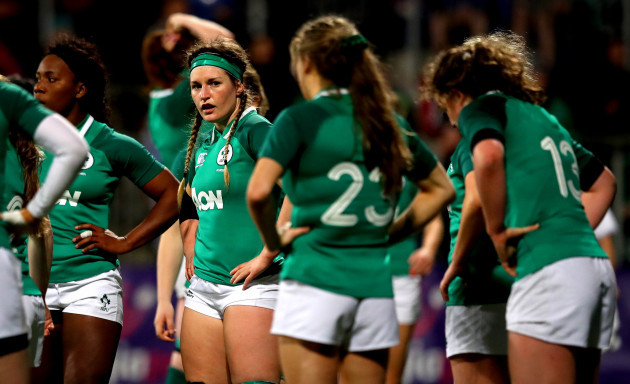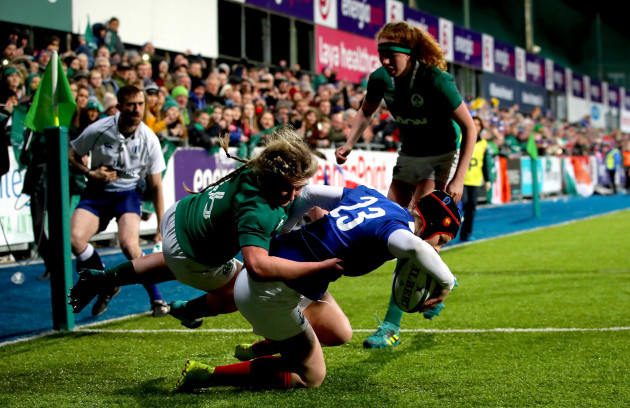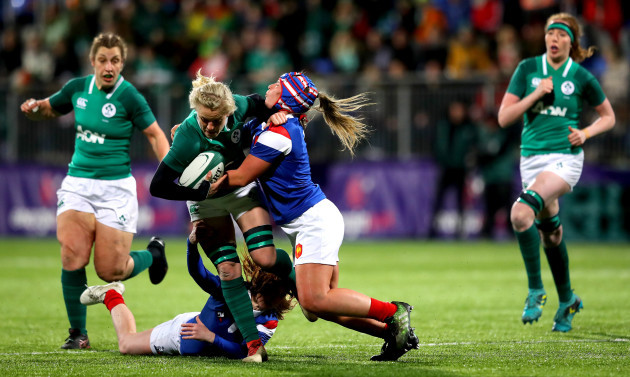Ryan Bailey reports from Donnybrook
A RECORD-BREAKING crowd made this a progressive night for women’s rugby, but again there were few signs of growth on the pitch as Ireland were guilty of making the same debilitating errors that have seen them fall so worryingly off the pace.
It would take a thorough post-match inquiry to extract any genuine positives from another fitful and disappointing performance from Adam Griggs’ side, their glaring deficiencies once again exposed by a more skilful, physical and clinical French outfit.
There was a sense of déjà vu throughout the 80 minutes at Donnybrook, as Ireland brought spirit and fight to the contest but little else. And then again afterwards, a feeling of déjà vu, when Griggs and his players delivered their immediate thoughts at the full-time whistle.
“Unfortunately we’re having some lapses in concentration and those lapses are costing us two or three tries,” the head coach said.
“You can allow one lapse but you’ve got to bounce back and make sure you problem solve on the go in not conceding more tries. You don’t want to make the hill that much harder to climb.
“We have to be honest with ourselves. Games could be tighter. When you end up chasing the game you do other things you wouldn’t normally do. It costs you more points. We have to be better in those areas.”
The same mistakes, the same areas of concern, the same frustration. An inability to retain the ball, a lack of creativity and ingenuity in attack, a glaring defect in the defensive system, or simply in the way the players tackle. Costly lapses in concentration and poor technique are inexcusable at this level.
It has been the story of the championship, this year and many preceding that too. A third-place finish last year left major room for improvement, but there was cause for optimism. Three defeats from four this time around, with a trip to Wales to come on the final weekend, means a fifth-place finish is a very real possibility. Progress?
There are only so many times you can ‘take the learnings’ from a heavy defeat, because at some stage a team must actually fix the errors and build on these experiences moving forward. It doesn’t feel like this current Ireland team — as young as they are — are moving anywhere.
Ireland had 48% possession and 44% territory, yet scored 30 less points on Saturday evening. Two of their three tries came via a set-piece, and while the lineout and scrum is an obvious strength, they carry little threat anywhere else on the pitch.
Out-half Nicole Fowley kicked far too much in the first half and then kicked aimlessly down the throat of the French back three in the second, as Ireland’s exit strategy and poor kick-chase only invited more pressure on their line.
“It killed us,” former coach Philip Doyle lamented on RTÉ.
The home side missed 24 of their 125 tackles, while conceding 12 penalties and leaking seven tries. Granted France are the defending Six Nations champions, and ranked third in the world, but seven defeats in their last eight games means the graph is only going in one direction for Ireland.
The crowd of 6,047 — 1,410 more than the attendance on the opening weekend for the England game, which ended with a similar result — cheered right until the very end, and there is certainly no faulting the effort and commitment of the Ireland players, but they need to start producing 80-minute performances of real substance.
They had battled valiantly at the start. Ireland, although conceding a try within the first three minutes, were in the contest for the opening half an hour, putting the French side under pressure at the lineout and scrum, and were rewarded through first-half tries from Ciara Griffin and Claire Molloy.
But France, with World Player of the Year Jessy Trémoulière back from injury, operate on another level and they showed their clinical edge to pull clear before the break, crossing four times through Caroline Thomas, Ian Jason, Lise Arricastre and player of the match Caroline Boujard. From there, it was a long evening for the home side.
“It’s the finer details that are letting us down,” Molloy says. “It’s basics for us that we’re not executing. I think what we have to build on is performing for more than just 20/30 minutes in a game.
“It is disappointing, but I was more happy with our performance in attack. We played more attacking rugby, our skills were sharper at times, we looked more threatening and we were less predictable.
You’ve got to remember the caps of these girls. When your lineout callers are of 10 and 12 caps. What we’re facing is a vast array of experience in the French side, in the English side. We’ve got a very young team. I’ve got more caps than the whole pack, and that says a lot.
Indeed, this is a young Irish side, many of whom are only finding their feet on the international stage and in the green jersey, but at the same time the inexperience excuse only washes for so long.
These occasions are harsh learning environments for the likes of Enya Breen, who was making her debut in midfield, and 17-year-old Beibhinn Parsons who came off the bench in the second half.
“There’s no quick fix unfortunately to tonight, there is a severe lack in attack,” Doyle, who oversaw Ireland’s last Six Nations success in 2015, continued. “We can only play one way at a time.”
Griffin was asked if there were green shoots of positivity from the performance. She remained adamantly upbeat: “Yeah, definitely, you can see there, 80 was gone on the clock but we didn’t give up, we kept trying to play.”
The bottom line, however, is that heart and grit will only get you so far. As England head towards full-time professionalism, France continue to make exciting progress and even Italy display reasons for optimism, Ireland are trailing behind. They’ve won just 12 of their 31 games since lifting the Six Nations back in 2015. That’s a 38% win ratio.
In its ‘Women in Rugby’ action plan published last year, the IRFU targeted consistent top-three finishes and one title in the Six Nations over the next five years, as well as a first-ever top-six finish at the 2021 World Cup. All of that seems fanciful right now.
For now, the focus must be on the Cardiff Arms Park next weekend. A six-day turnaround means there is little time to dwell on another disappointing evening, rather channel the frustration into righting a few wrongs against Wales on St Patrick’s Day.
“It’s massive,” Molloy adds. “We have to target that game as a win. We let ourselves down in Italy, we’ve got to aim for fourth place at least.”
Three defeats from four in this campaign makes victory in the final round imperative, or else Ireland face into the reality of their worst Six Nations finish in 13 years. For all the talk of building and development, therein lies the true barometer of where this team sit.
Andy Dunne joins Murray Kinsella and Ryan Bailey to discuss Joe Schmidt’s undroppables and how France might attack Ireland’s predictability in The42 Rugby Weekly.
The42 Rugby Weekly / SoundCloud
Subscribe to our new podcast, The42 Rugby Weekly, here:



